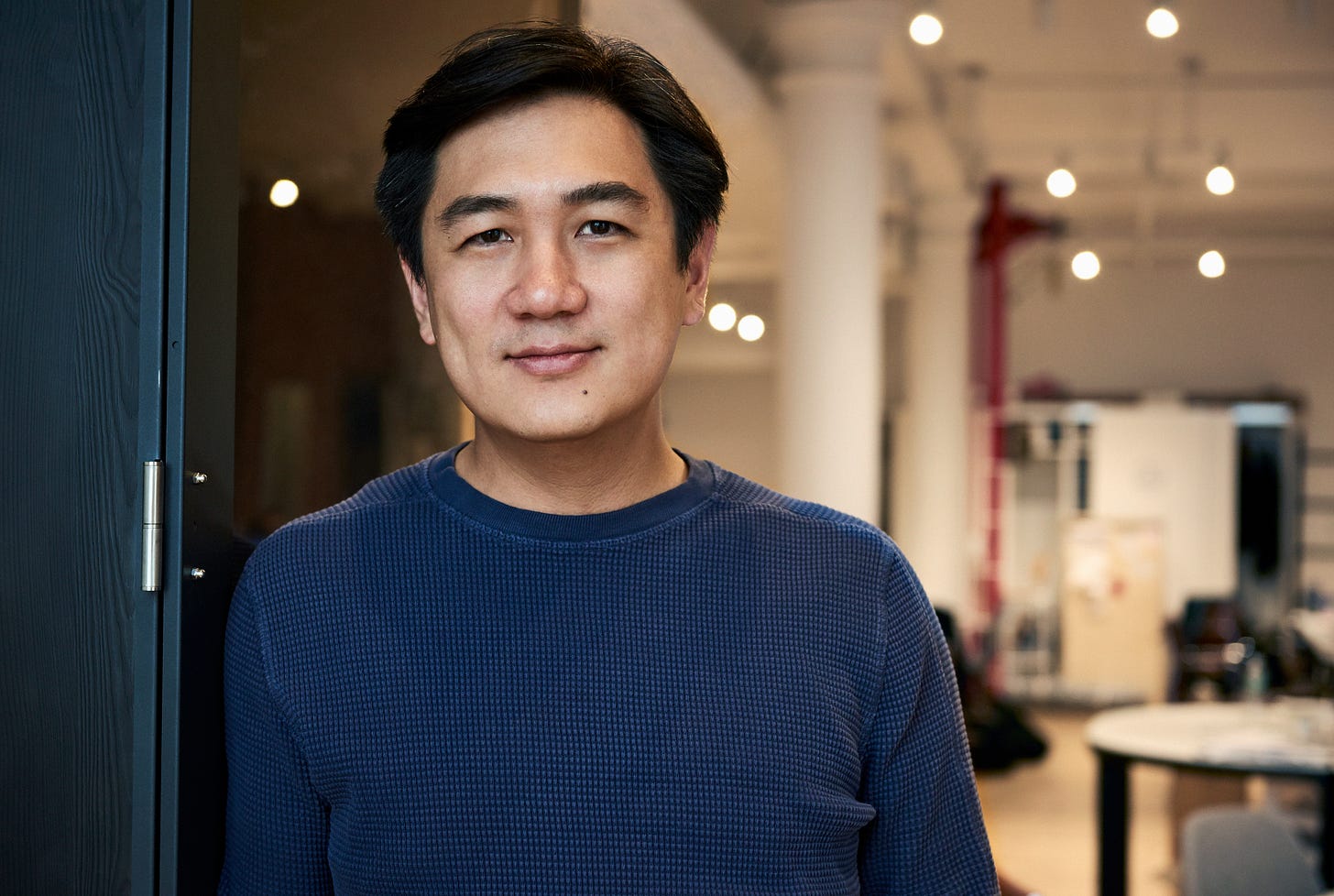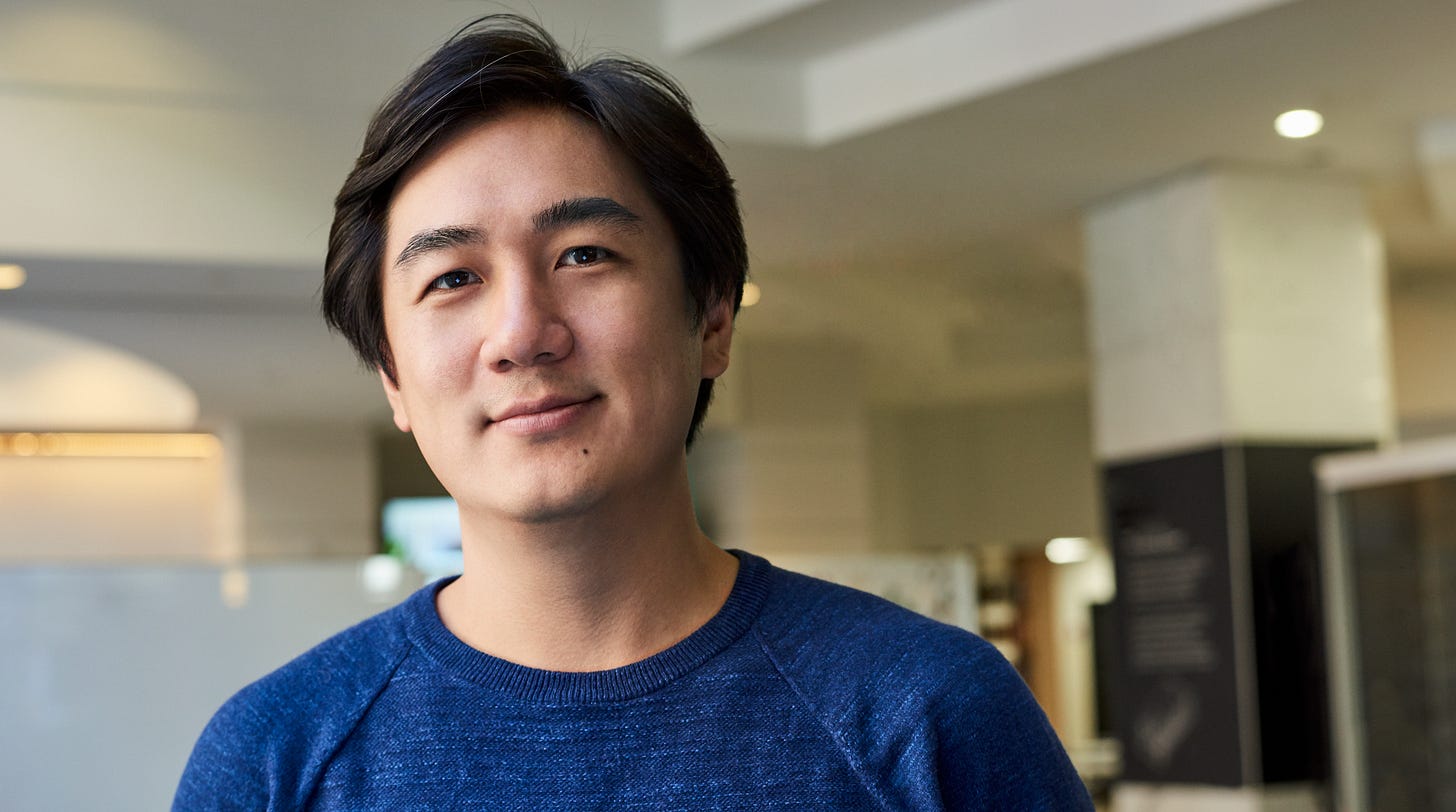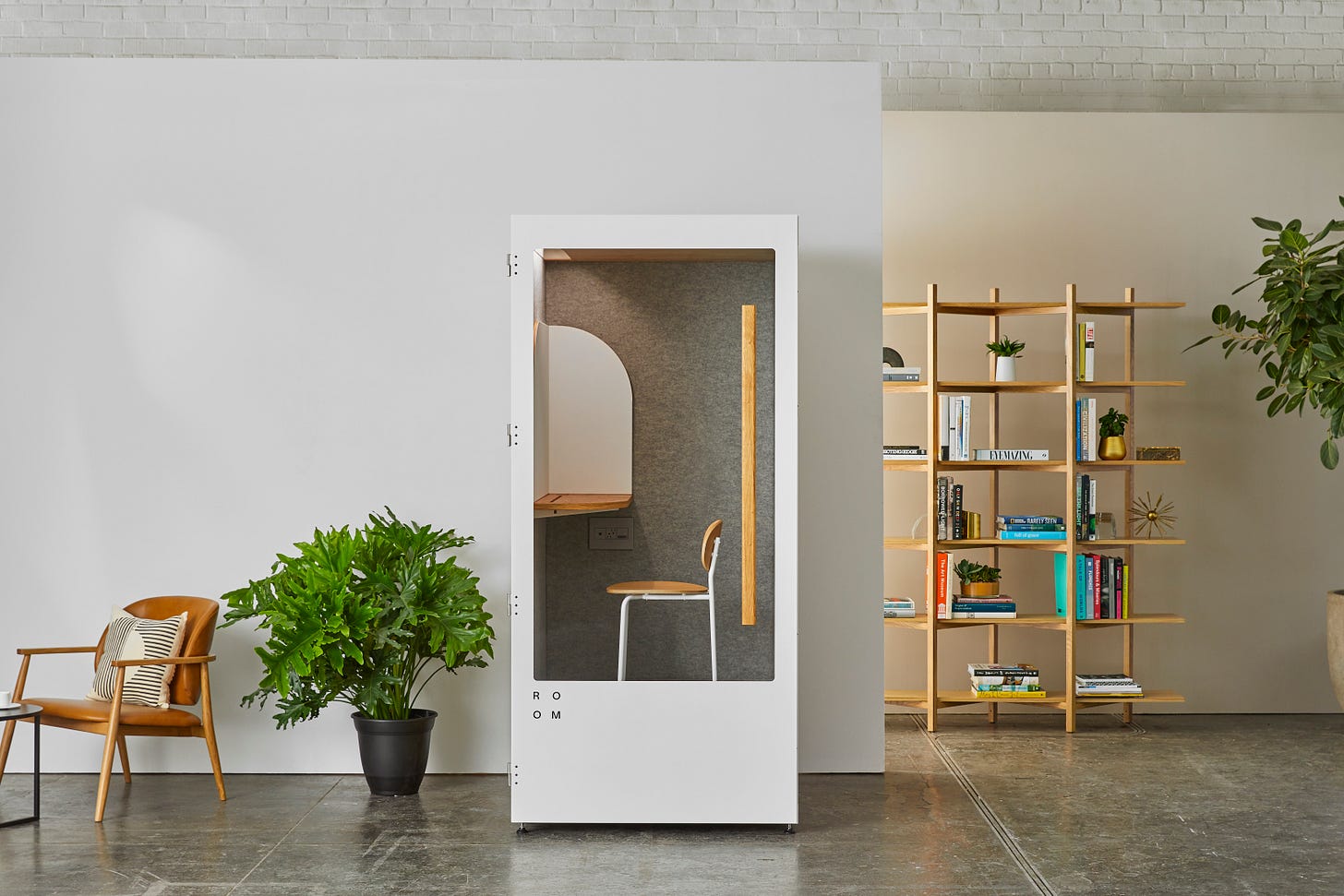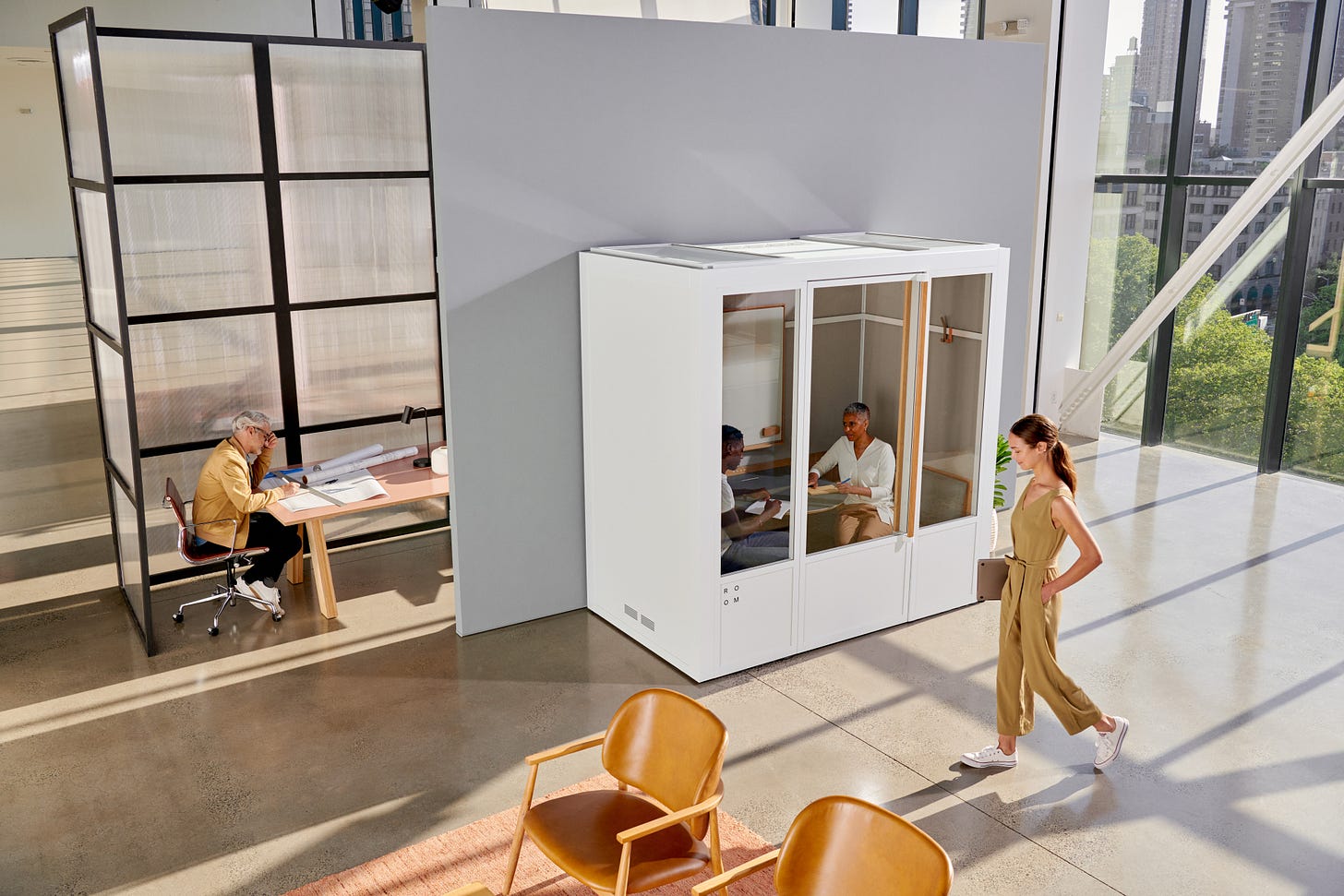(Ep 41) ROOM -> Reinventing the modern workplace 🚪
Brian Chen | Co-Founder & CEO
Hey friends,
Back again with another edition of The Founder recap - this is Episode 41. If you’re new here, my goal is to give you a quick synopsis of what got me thinking from this week’s episode of The Founder Podcast in 5 minutes or less.
No idea what The Founder is? Read this.
Mission control:
Learn -> Founder favorite resources
Free money -> Discount codes
And who am I?
I’m Kallaway - a future founder trying to get some answers before I jump in the ball pit myself.
Let’s get it.
This Week’s Episode (Ep 41) 🚪
Guest -> Brian Chen, Co-Founder & CEO of Room
Mission -> Room is on a mission to change the way offices are built by creating modular, flexible solutions that transform the workplace.
Episode available on -> Apple Podcasts | Spotify | YouTube | Website
In this episode we talk with Brian about…
👶 The origin story of Room
🧳 Dropping out of MIT to start Bluesmart, a smart luggage company
🔑 Key decisions, successes and struggles in scaling Room to $40M in revenue
🤕 Dissecting Covid’s short-term pain and long-term tailwinds for the office furniture industry
🤔 What differentiates good and great CEOs
🔨 Brainstorm of the week -> Housing market liquidity, fractional expert networks and subscription jeans
Summary 🔍
What is Room and how did Brian get started?
Brian is a second-time founder, having previously launched Bluesmart, a smart luggage company built to supercharge your suitcase through advanced technology and connectivity solutions.
After Bluesmart was acquired by Travelpro in 2018, Brian took some time to travel the world and pick up a few side projects.
While consulting for a couple of startups, he was toying with a few of his own ideas when Ryan Petersen (Founder of Flexport) and Henrik Zillmer (Co-Founder of AirHelp) came to him with their latest problem - privacy in the office.
The open floor plan concept wasn’t working and they suggested Brian look into building and selling phone booths for offices.
Although initially intrigued, Brian decided he would treat the phone booths as another side project while he investigated further.
A few months later, Room was born.
Room is on a mission to change the way offices are built by creating modular, flexible solutions that transform the workplace.
Today, they go to market with their flagship soundproof phone booth as well as newly launched meeting and focus rooms.
In the spirit of convenient and adaptive solutions, their phone booth ships flat and assembles on-site with a single tool.
Room is poised to take advantage of massive tailwinds in a post-Covid world, equipping offices with the infrastructure to optimize for what their people want most - flexibility.
In August of 2020, Room raised their $12.5M Series A round of funding led by Slow Ventures.
🚀 Here’s why I’m a fan and excited about the future of Room 🚀
Room has built an incredible suite of products. As you can see from the pictures above, their industrial design is world-class and their structures were optimally designed for comfort and flexibility. As the world returns to offices in a post-Covid world, I believe employees will expect an elevated level of privacy. Rebuilding the camaraderie lost during the “work from home” period will be exciting in spurts, but most will expect offsetting times of focus and isolation. Room’s products are positioned perfectly to enable an adaptive workspace that employees want to return to. With many companies terminating their leases in 2020 amidst the uncertainty, Room should have a seat at the table in helping leaders reimagine their future offices from the ground up.
Brian’s Startup Manifesto 📜
What’s a Startup Manifesto?
During each episode, I ask all of my founder guests this question:
If you had to write a Startup Manifesto with 5 of the most important key lessons or pitfalls to avoid when starting out, what would they be?
Here’s what Brian had to say:
It’s always best to think of your startup as a project rather than a business at first. When you think of it like a business first, you focus on all the things that go into making a business run like accounting, legal, board, etc. If you think of it like a project, you can stay super lean and focus on building an amazing product.
Be a historian and a student of history for your business and industry. There is a startup graveyard that can be studied in detail. Often times, if you’re tackling a space, you’re probably not the first person to try it. If you’re going to be successful, a lot of it is luck, but there’s many lessons to be learned from those before you. Ask yourself, “Why have previous companies failed?” Be a student of history to understand where you fit into the larger context.
When hiring, know what excellence looks like. That is absolutely critical. Without understanding what excellence is for a given position, it becomes extremely difficult to identify the right candidate.
When it comes to customer acquisition, think about repeatable growth. It can be easy to have one time hacks for growth. Sometimes, that’s what you need to get started, but you really want to build a repeatable growth engine instead of shortcuts that might net you short-term spikes. Crowdfunding is an example – you get a nice spike in the beginning but you can’t build a business only using crowdfunding campaigns.
Always be learning. Learn from customers, competitors, people you hire, etc. If you’re building a startup and doing it right, the learning curve is going to be steep along every part of the journey. You need to always be a sponge.
What Got Me Thinking From the Episode 🤔
After reflecting on my conversation with Brian, here’s something that really got my wheels spinning:
The two sides of Covid-19 👍🏽
The Covid pandemic has impacted nearly every business in the world.
Some industries, like remote software, home gym equipment, and consumer staples grew off the charts.
Others, like restaurants, in-person entertainment and commercial office equipment, were ravaged.
Room’s pandemic scenario is an interesting one to study.
Prior to the pandemic, Room was born on a thesis that people wanted a more flexible, adaptive working environment. They had close to $40M in revenue and were scaling rapidly - an indicator of early product-market fit.
The short-term impact of the pandemic was obviously devastating. If all offices closed, there was no reason for any of their customers to buy their products.
In April and May, it was tough to know if this was a small 3-month blip or if offices would be changed forever.
Brian mentioned during the interview that there was a period in May where lots of people were talking about returning to work with plexiglass dividers between desks. He said the Room leadership team had to take a long look at their product roadmap and evaluate if this was a direction they needed to go in the interim.
Ultimately, they opted against it and released 3 new products (focus and meeting rooms) instead.
It’s a crazy scenario to think about - completely revamping your roadmap and product strategy on a dime, at the hands of an event you have no control over.
When you think about the impact of Covid long-term, it’s impossible to overlook the tailwinds at Room’s back:
Acceleration of flexible working - Whether we like it or not, Covid accelerated the requirement for adaptable and flexible working environments by 5-10 years. In a pre-pandemic world, even the most progressive employees seldom requested functional spaces that enabled flexibility. Now, everyone in the world expects it. This means that all companies need to reevaluate their workspace playbook.
Need for privacy and protection - It may be a while before all employees are ready to return to the office full-time. When they do go in, they’re going to want to have private, isolated space where they feel safe to do their work. Open floor plans are not built to serve this need. They were actually designed for the opposite - to foster more spontaneous sharing and collaboration. Similarly, this is not a request, it’s a requirement.
Requests for multi-functional spaces - In 2019, Room launched a collaboration with Calm where they turned their phone booths into meditation rooms. They frosted the glass for privacy and added small accents that facilitated a meditative environment. In a post-pandemic world, employees will have become used to doing workouts in the middle of the day and prioritizing their wellness. Most won’t want to give that up and will resist going back to an in-person environment that doesn’t solve for it. I hypothesize there will be an emergence of flexible spaces dedicated to wellness intermixed throughout offices. Room is well positioned to lead that charge.
📚 In addition to the episode, Brian shared some of his go-to books and other resources. Check them out here under “Founder Favorites.”
Wrapping it Up 📕
I hope you found this interesting and inspiring! If so and you want to help support our journey to bring The Founder to millions of people across the world, here’s a couple things that would be really valuable to me and the show:
If you enjoyed this post, share it with one friend that you think is on the same wavelength.
If you haven’t already, subscribe to this newsletter so you can get them delivered to your inbox each week!
Listen to the full podcast episode with Brian on Apple or Spotify. If you don’t have an hour to listen to the full episode, pick a couple of topics you’re interested in and skim through (topic time codes in the show notes).
Watch the full episode and our top clips on YouTube.
If you’re feeling super giving:
Find our show on Apple Podcasts (https://apple.co/2VCosu6) and (1) subscribe, (2) give a 5-star rating and (3) leave a couple sentence positive review. This doesn’t seem like it would move the needle but it really is a massive help!
Till next time ✌️
Kallaway
Want more? Check out other companies we’ve featured on the show!
— 📖 36. Toucan | Taylor Nieman
— 🛋️ 34. Burrow | Stephen Kuhl
— 🛌 30. Eight Sleep | Matteo Franceschetti
— 🌵 25. The Sill | Eliza Blank
— 🥦 22. Levels | Josh Clemente
— 💍 11. The Clear Cut | Olivia Landau and Kyle Simon
— 🥘 7. Kettle & Fire | Justin Mares
— 🥾 2. Thursday Boots | Connor Wilson
See any mistakes? Let me know (kallaway@thefounderpod.com)





